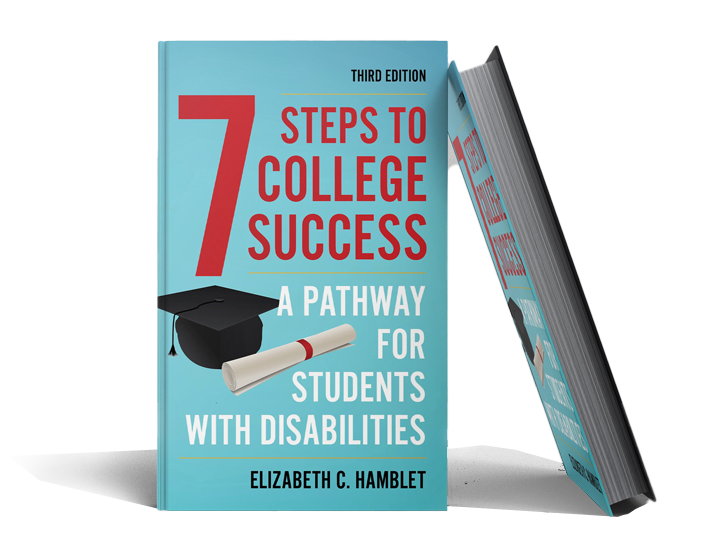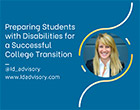Introduction
I field a lot of questions about how to find a college that is a good fit for their student with ADHD and/or learning disabilities. In my opinion, students’ college search should start with the same basics that it would for anyone — institution size, range of available majors, and core and graduation requirements. I have some thoughts. (See this post I wrote for Understood for more ideas).
Parents helping with the college searh should make sure their student is engaged with the process and developing a sense of the realities of the college environment, which may differ significantly from their current school experience. Fit is crucial, since two or four years is a long time to spend in a place that doesn’t suit a student. Checking all of these elements can help to make sure the schools on a student’s list provide that fit.
“FIT” CONSIDERATIONS INCLUDE:
What is the term length?
Schools generally operate on a quarter, trimester, or semester basis.
Benefits of shorter terms can include:
- Taking fewer classes at once (fewer assignments to focus on at the same time)
- Classes only run for a few weeks, so classes your student doesn’t like won’t last very long
*A drawback can be that classes move very quickly, and extensions for assignments are not a typical accommodation for students with learning disabilities or ADHD.
Benefits of semester terms can include:
- A chance to dive more deeply into a topic of interest
- A slower pace
*A drawback can be that your student may be expected to take more classes at once, which can be overwhelming.
How do students earn their grades?
At some schools, grades are evaluated mostly through testing, which can be positive if your student doesn’t like to write papers. Some schools assess students mainly through papers and projects, which may be appealing if your student is not a good test-taker. Ask your student to think about these options as part of the college search.
Can students start with classes for the major they want?
Rather than make freshmen take the usual introductory, general education classes first, some schools (such as Champlain College, with its Upside-Down Curriculum) may allow students to take some of the more focused classes for the major they wish to pursue.This not only will allow them to find out sooner whether they really want to study in a certain area, but it also can help with motivation (important if for students with ADHD), since they will get to study a subject that really interests them while they also work on fulfilling other requirements.
What supports are built in, and which do students have to ask for as accommodations?
At some schools, students are expected to take notes on a laptop; at others, students will need special permission to use one. Student can ask questions like:
- do the majority of professors typically put up presentation slides ahead of time and/or post recordings of their classes for all of their students to access?
- is software like Read and Write Gold, a text-to-speech program, is available to all students through the college’s computer system (this is true at some schools)
Built-in supports like these may lessen the need for students to ask for disability-related accommodations, an idea that may be appealing to them. Read this post or watch this video for ideas on what to look at when reviewing colleges DS office and other supports. I offer a free form to help students take notes as they do this research.
What are the limits on support?
Most colleges have a general tutoring center staffed by upperclassmen, and some may have a writing center, math help rooms, and other similar supports. Tutoring may be done in small groups, and students may only be allowed a certain number of sessions. Writing center visits may be offered on a drop-in basis only.
Students can ask whether registering with the disability services office allows them to schedule appointments at these centers, and how often are they allowed to come in for sessions.
Though some students will be able to continue working with their current therapist, for others, on-campus psychological counseling services may be important. When looking at colleges, students can ask:
- If they’ve already been diagnosed with depression or anxiety or other difficulties,would they have to go through an intake appointment at the counseling center before he can see someone there for therapy?
- How frequently can they see a therapist, and is there a cap on how many visits they can have in a term (or year)?
It’s important to know that most colleges don’t employ learning disability specialists or ADHD coaches to work with students; this is something you can ask about. At schools that do provide coaches, students can ask:
- How often can they meet with students?
- Do the people working in these positions have a teaching background (and in what subjects?)
How far is the school from home?
Distance can have its benefits and drawbacks. Students who have relied upon parents to provide structure to help stay on task academically may find the pull of home tempting if they go to school nearby. Such continued support could be helpful, but shuttling between campus and home frequently for home has the potential to jeopardize a student’s adjustment to school. (Research shows that social integration is factor associated with success at college.)
On the other hand, at least at the beginning, going home on occasion (e.g., to get help creating interim deadlines for an upcoming paper or to study before a major exam) can be helpful, and it may be a comfort for students not yet ready to handle the party culture on campus (if there is one – this is something else students can research).
If the school in an isolated location, how hard is it to get somewhere off campus?
When looking at schools in rural areas, students can ask whether there is a health center and – if so – whether it can refill your student’s prescriptions. (Alternatively, they can ask their doctor and insurance company whether they can get a three-month supply to get through the term.) If not, how much trouble will it be to get off-campus to the nearest pharmacy:
- Does the school run shuttles to the nearest town?
- Is there taxi service nearby?
- Does Lyft or Uber serve the area?
Location is important for students who don’t think the campus supports will meet other needs, too. For instance, if they want to work with a learning disabilities specialist or a therapist, are there enough professionals in the surrounding area to allow them to find one who’ll be good fit? (One way around the location problem can be virtual tutoring.)
What is the overall student body like?
The social environment can affect how comfortable students feel at college. Questions they can ask themselves include:
- Will they feel stressed if their classmates are so competitive with each other that they aren’t willing to form a study group?
- Are they worried that classmates who party all the time will create an atmosphere that makes it even harder for them to resist distractions and get to work?
If the school in an isolated location, how hard is it to get somewhere off campus?
When looking at schools in rural areas, students can ask whether there is a health center and – if so – whether it can refill your student’s prescriptions. (Alternatively, they can ask their doctor and insurance company whether they can get a three-month supply to get through the term.) If not, how much trouble will it be to get off-campus to the nearest pharmacy:
- Does the school run shuttles to the nearest town?
- Is there taxi service nearby?
- Does Lyft or Uber serve the area?
Location is important for students who don’t think the campus supports will meet other needs, too. For instance, if they want to work with a learning disabilities specialist or a therapist, are there enough professionals in the surrounding area to allow them to find one who’ll be good fit? (One way around the location problem can be virtual tutoring.)
How far is the school from home?
Distance can have its benefits and drawbacks. Students who have relied upon parents to provide structure to help stay on task academically may find the pull of home tempting if they go to school nearby. Such continued support could be helpful, but shuttling between campus and home frequently for home has the potential to jeopardize a student’s adjustment to school. (Research shows that social integration is factor associated with success at college.)
On the other hand, at least at the beginning, going home on occasion (e.g., to get help creating interim deadlines for an upcoming paper or to study before a major exam) can be helpful, and it may be a comfort for students not yet ready to handle the party culture on campus (if there is one – this is something else students can research).
What is the overall student body like?
The social environment can affect how comfortable students feel at college. Questions they can ask themselves include:
- Will they feel stressed if their classmates are so competitive with each other that they aren’t willing to form a study group?
- Are they worried that classmates who party all the time will create an atmosphere that makes it even harder for them to resist distractions and get to work?



